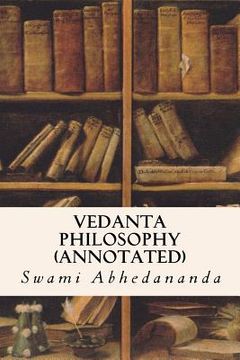Synopsis "Vedanta Philosophy (annotated) (in English)"
Vedanta Philosophy is an Eastern philosophy classic by Swami Abhedananda. The visible phenomena of the universe are bound by the universal law of cause and effect. The effect is visible or perceptible, while the cause is invisible or imperceptible. The falling of an apple from a tree is the effect of a certain invisible force called gravitation. Although the force cannot be perceived by the senses, its expression is visible. Vedanta is one of the schools of Hindu philosophy. Vedanta literally means "end of the Vedas", reflecting ideas that emerged from the speculations and philosophies contained in the Upanishads. It does not stand for one comprehensive or unifying doctrine. Rather it is an umbrella term for many sub-traditions, ranging from dualism to non-dualism, all of which developed on the basis of a common textual connection called the Prasthanatrayi. The Prasthanatrayi is a collective term for the Principal Upanishads, the Brahma Sutras and the Bhagavad Gita. All Vedanta schools, in their deliberations, concern themselves with the following three categories but differ in their views regarding the concept and the relations between them: Brahman - the ultimate metaphysical reality, Atman / Jivatman - the individual soul or self, and Prakriti - the empirical world, ever-changing physical universe, body and matter. Some of the better known sub-traditions of Vedanta include Advaita (non-dualism), Vishishtadvaita (qualified non-dualism), and Dvaita (dualism). Most other Vedantic sub-traditions are subsumed under the term Bhedabheda (difference and non-difference). Over time, Vedanta adopted ideas from other orthodox schools like Yoga and Nyaya, and, through this syncretism, became the most prominent school of Hinduism. Many extant forms of Vaishnavism, Shaivism and Shaktism have been significantly shaped and influenced by the doctrines of different schools of Vedanta. The Vedanta school has had a historic and central influence on Hinduism.

